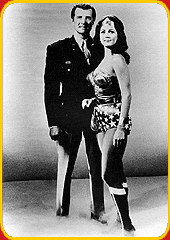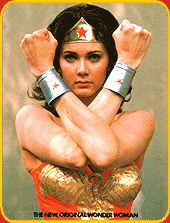 
|
 A
Segment of the ABC Friday Night Movie Special Double Feature. 11/7/75.
In Color. 75 minutes. Produced by Douglas S. Cramer (Warner Bros.
television). Directed by leonard Horn. Teleplay by Stanlet Ralph Ross
based on a character by Charles Moulton. With: Lynda Carter, Lyle
Waggoner, Cloris Leachman, Stella Stevens, Red Buttons, Eric Braden,
Kenneth Mars, John Randolph, Fannie Flagg, Severn Darden, Henry Gibson. A
Segment of the ABC Friday Night Movie Special Double Feature. 11/7/75.
In Color. 75 minutes. Produced by Douglas S. Cramer (Warner Bros.
television). Directed by leonard Horn. Teleplay by Stanlet Ralph Ross
based on a character by Charles Moulton. With: Lynda Carter, Lyle
Waggoner, Cloris Leachman, Stella Stevens, Red Buttons, Eric Braden,
Kenneth Mars, John Randolph, Fannie Flagg, Severn Darden, Henry Gibson. |
 |
|
In this era of concern over the place of women in today's society, the
adaptation of the most famous comic strip heroine, Wonder Woman, to the
screen, in this case the small screen, seems appropriate. last season we
were offered a modernized version of the character sans her traditional
costume and accompaniments. This second attempt by a new creative team
presents Wonder Woman in the person of wide-eyed Lynda Carter in her
dazzling original form. The magic lasso, bullet repellent bracelets and
invisible plane are all in evidence. Stanley Ralph Ross' screenplay is
heavily based on two of the character's appearances: the January 1942
issue of Sensation Comics and the summer 1942 premier issue of Wonder
Woman comics. |
 |
|
The opening credits set the mood for what is to follow. Animated comic
panels come to life and dialog balloons indicate the performers.
Unfortunately, the comic book motif has been carried too far. What works
in one media does not necessarily work in another. Surely the damage
done to Batman several seasons back attested to the failure of milking
comic strips purely for their camp elements, but here we are put through
the tired routine all over again. While Lynda Carter plays her role
straight, all of the supporting players under Leonard Horn's direction
turn in ridiculously self-conscious performances. |
 |
|
The plot, derived directly form the comic books, introduces the heroine
during World War II and her activities against a group of Axis agents.
Had the scenes been played on the level the result would certainly have
been more worthwhile. But the writers and performers have it their own
way with exchanges like the one between General Blankenship (John
Randolph) and Major Steve Trevor (Lyle Waggoner) where the General tells
Steve, "Do your best, boy", and the Major replies, "General I can only
do my best." |
 |
|
Supposedly, our appreciation is to be measured in groans of delight at
such delicious innocence and naïveté. The film's few action scenes,
though well done, are hampered by a piercing choral arrangement as
grating on the nerves as that old Batman theme song. One asset of this
pilot film is obvious however, Lynda Carter makes for one stunningly
attired heroine! |

A Segment of the ABC Friday Night Movie Special Double Feature. 11/7/75. In Color. 75 minutes. Produced by Douglas S. Cramer (Warner Bros. television). Directed by leonard Horn. Teleplay by Stanlet Ralph Ross based on a character by Charles Moulton. With: Lynda Carter, Lyle Waggoner, Cloris Leachman, Stella Stevens, Red Buttons, Eric Braden, Kenneth Mars, John Randolph, Fannie Flagg, Severn Darden, Henry Gibson.